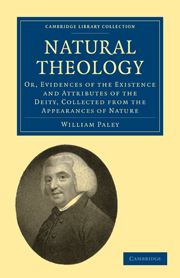 Natural Theology
Natural Theology Published online by Cambridge University Press: 07 September 2010
In all cafes, wherein the mind feels itfelf in danger of being confounded by variety, it is fure to reft upon a few ftrong points, or perhaps upon a fingle inftance. Amongft a multitude of proofs, it is one that does the bufinefs. If we obferve in any argument, that hardly two minds fix upon the fame inftance, the diverfity of choice fhews the ftrength of the argument, becaufe it fhews the number and competition of the examples. There is no fubject in which the tendency to dwell upon felect or fingle topics is fo ufual, becaufe there is no fubject, of which, in its full extent, the latitude is fo great, as that of natural hiftory applied to the proof of an intelligent Creator. For my part, I take my ftand in human anatomy: and the examples of mechanifm I fhould be apt to draw out from the copious catalogue which it fupplies, are the pivot upon which the head turns, the ligament within the focket of the hip joint, the pulley or trochlear mufcle of the eye, the epiglottis, the bandages which tie down the tendons of the wrift and inftep, the flit or perforated mufcles at the hands and feet, the knitting of the inteftines to the mefentery, the courfe of the chyle into the blood, and the conftitution of the fexes as extended throughout the whole of the animal creation.
To save this book to your Kindle, first ensure [email protected] is added to your Approved Personal Document E-mail List under your Personal Document Settings on the Manage Your Content and Devices page of your Amazon account. Then enter the ‘name’ part of your Kindle email address below. Find out more about saving to your Kindle.
Note you can select to save to either the @free.kindle.com or @kindle.com variations. ‘@free.kindle.com’ emails are free but can only be saved to your device when it is connected to wi-fi. ‘@kindle.com’ emails can be delivered even when you are not connected to wi-fi, but note that service fees apply.
Find out more about the Kindle Personal Document Service.
To save content items to your account, please confirm that you agree to abide by our usage policies. If this is the first time you use this feature, you will be asked to authorise Cambridge Core to connect with your account. Find out more about saving content to Dropbox.
To save content items to your account, please confirm that you agree to abide by our usage policies. If this is the first time you use this feature, you will be asked to authorise Cambridge Core to connect with your account. Find out more about saving content to Google Drive.